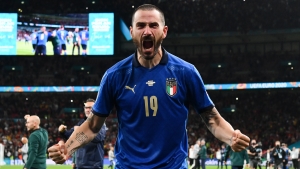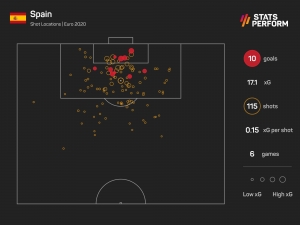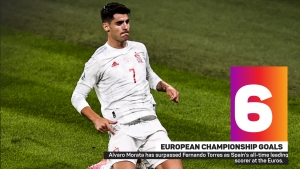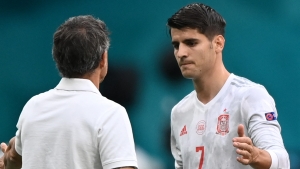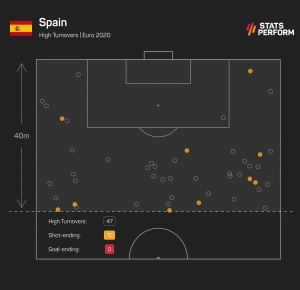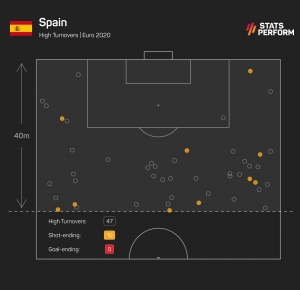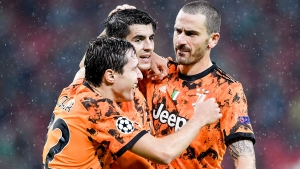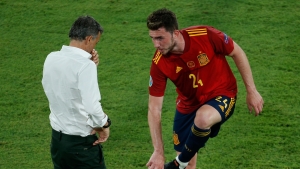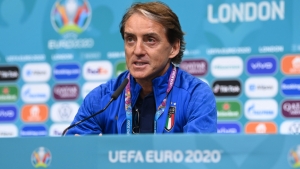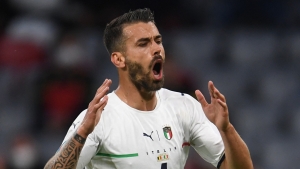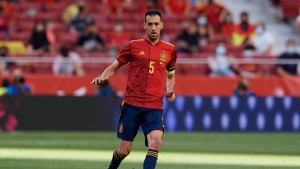Euro 2020 is disappearing before our eyes, with the delayed tournament somehow already at the business end as we head into the final three matches.
It's been a thrill ride since the very beginning. From Italy making a sparkling start and Denmark rallying after Christian Eriksen's medical emergency, to France falling at the last 16 and England reaching the semi-finals of a second successive major tournament.
Italy, England, Spain and Denmark are all that's left as Euro 2020 enters its final week, and at this point it seems particularly tricky to call, particularly between first three.
But, given how integral statistics are to football these days, data can potentially give you edge when attempting to predict certain outcomes, and this is where Stats Perform's Artificial Intelligence team comes in as they've used Opta's extensive data reserves to quantify each semi-finalist's chances of winning tournament.
Every match has been run through the Stats Perform Euros Prediction model to calculate the estimated probability of the outcome (win, draw or loss). This uses odds from betting markets and Stats Perform team rankings, which are based on historical and recent performances and also takes into consideration the strength of each side's opponents.
The games are then simulated 40,000 times and analysed, providing the AI team with a percentage for each nation, showing the probability of them ultimately lifting the trophy at Wembley on July 11.
Without any further ado, let's take a look at the results…
Denmark (8.8 per cent chance of winning Euro 2020)
The fact Denmark even got out of their group was an achievement in itself as they became the first team to ever reach the knockout phase having lost their opening two matches. Yet, here we are.
The Danes are into the last four for the first time since winning the competition in 1992 and have really hit their stride since their two early defeats, with only Spain (12) outscoring Kasper Hjulmands' men until this point (11) – that haul is the most they've ever managed at a major tournament.
Denmark have projected a real sense of unity since Eriksen collapsed against Finland, and it's hard to believe they will fear anyone at this point.
Nevertheless, England should represent trickier opposition than the likes of Wales and the Czech Republic, which is perhaps reflected by the fact their 8.8 per cent chance of winning the title is the lowest of the four remaining teams.
But if standout performers such as Joakim Maehle, Simon Kjaer and Pierre-Emile Hojbjerg continue to deliver the goods, who's to say they cannot emulate the 1992 vintage?
Spain (23.1 per cent)
Luis Enrique's Spain have been a fascinating watch at Euro 2020, partly because they somehow manage to flitter between exceptional and unrefined. Their erratic nature has become one of the sideshows of the tournament.
For example, only the Netherlands (53) have forced more high turnovers than Spain, while La Roja are the sole side to break the 100 barrier in terms of sequences of 10 or more passes (147). They only allow their opponents 8.3 passes on average in the defensive third before they initiate a defensive action, indicating they are the most intense pressers at the tournament, and their haul of 12 goals is more than anyone else.
Yet, their xGA (expected goals against) of 6.8 is comfortably the worst of the four teams left, and their xG underperformance of 3.6 is the biggest of all 24 teams. In short, these points suggest that not only have Spain been lucky to only concede five times, they are also the most wasteful team at Euro 2020.
That's obviously not helped by the fact Gerard Moreno (no goals from 3.3 xG) and Alvaro Morata (two goals from 3.95 xG) are among the three players with the worst xG underperformance records in the competition.
However, they've got this far and have still crafted plenty of goal-scoring opportunities, with their record of 25 big chances a tournament-high. If the penny drops with Spain's forwards and they start to convert in line with their xG, they could have real joy.
England (29.1 per cent)
It would be fair to say England's performances in the group stage, although not alarming, certainly didn't inspire a huge amount of confidence as they scored just two goals. But in the two games since, they have netted six times and attracted significant acclaim.
The fact they don't necessarily stand out in many specific team metrics (perhaps bar 10+ passing sequences – 98, second to Spain) is arguably partly down to how flexible Gareth Southgate's team have been in their approach to specific games. For example, their passes per defensive action (PPDA) dropped from 13.7 against Scotland to 25.9 against Germany, suggesting they were concerned about the German midfield playing through their press and instead sat back more in order to cut off passing routes.
Of course, adapting to your opponents is hardly revolutionary, most teams do it to a certain extent, but in a tournament where Spain and Italy have almost religiously stuck to principals and formations that govern their setups, England have chopped and changed.
It's clearly worked as well given the fact the Three Lions have equalled a major-tournament record of five successive clean sheets, while their 2.95 xGA (with no goals conceded) leads the way at Euro 2020.
With their defence seemingly watertight and Harry Kane finding some confidence with three goals in two games, England look in great shape. If our prediction model took into consideration that all of the remaining games are to be at Wembley, they'd likely be a bit closer to top spot.
Italy (38.9 per cent)
It seems like a long time ago now that Italy came into Euro 2020 as – some claimed at the time – unknown quantities. The common conception was that their 27-match unbeaten run coming into the tournament was misleading because most of the games were said to have been against sub-optimal opposition.
Well, they are now at 32 games unbeaten having won or drawn all of their five matches to this point at Euro 2020, setting a new national record in the process.
But, more than that, they've been utterly joyful to watch. They are relentless in attack, as highlighted by their tournament-leading shot (11) and goal-ending high turnovers (three), but also impressive at the back having only conceded one non-penalty goal.
Built around a solid core of Giorgio Chiellini, Leonardo Bonucci, Jorginho, Marco Verratti and Nicolo Barella that expertly blends craft and guile arguably unlike any team at Euro 2020, Roberto Mancini's turned Italy into a side that's not only been generally fun to watch, but also effective.
Spain represent a completely different challenge to any other side Italy have faced thus far, yet Luis Enrique's men have afforded their opponents plenty of chances. The Azzurri have been consistent throughout in attack, as demonstrated by their 11 goals from 10.3 xG. Without the one own goal in their favour, it would be 10 from 10.3 xG.
Italy have shown no major weaknesses en route to the semi-finals, and as such our model suggests it is they who have the greatest chance of success this week.
























